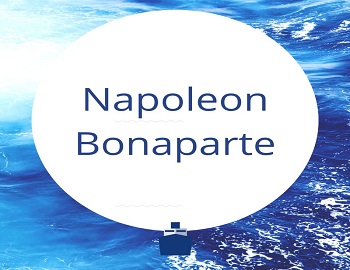Napoleon Bonaparte:
Napoleon Bonaparte was not only a great military leader, he was also a brilliant administrator. He brought almost the whole of Europe under his rule during the early part of the nineteenth century. Let us see what this great man achieved in his life and how the qualities he possessed enabled him to become a central figure in European history.
Napoleon was born in Corsica in 1769. He was the son of a simple, hardworking lawyer. When he went to school in France, his companions made fun of him because of his humble origin and his poverty. Napoleon decided to excel and win their respect. He devoted himself to his studies and soon became the brightest student in the class.
After school, Napoleon joined the French army. He fought his first battle at the age of twenty-four, against the British at Toulon. He so distinguished himself with his masterful use of guns and cavalry that he won rapid promotion. Within three years, at the age of twenty-seven, Napoleon became a general.
Napoleon found himself at the head of a ragged, half-starved army. His first task was to convert his ill-trained troops into a first-class fighting force. Napoleon, who had a magnetic personality, built up their confidence and inspired them to achieve the impossible. Then he led them into the plains of Italy and won battle after battle by brilliant moves on the battlefield which established his fame as a military commander. Thereafter, his soldiers dubbed him the “little corporal” because of his short stature.
The conquest of Italy aroused Napoleon’s ambition. He returned from his Italian campaigns to launch new schemes of conquest. He dreamed of conquering Egypt, Turkey, and even India. He marched against Egypt but was defeated by the British fleet led by Nelson. Napoleon escaped to France, which was in the midst of a revolution and took control of the reigns of power in Paris.
Napoleon immediately set about improving the living conditions in France with amazing energy. He simplified French law, constructed canals, roads, and bridges, and inspired many national programmes for the benefit of the people. Many of the reforms, that he made so long ago, are being followed by many other countries even today.
Napoleon became the emperor of France in 1804 when he was only thirty-five years old. For the next ten years, he led the armies of France in a series of battles during which he displayed his genius as a soldier. He ignored all previous methods of war and surprised his enemies, defeating them with his strategy. Even when England, Austria and Russia got together to fight him, he delivered their combined armies a crushing blow. In the battle of Ulm, the Austrians were forced to surrender despite the fact that their army was much greater in numbers.
One of the main reasons for Napoleon’s many victories was his exemplary leadership. He made quick decisions and never hesitated or fumbled. Napoleon said, “If you act promptly and with decision, you will get victory; wavering means failure”. He was bold and daring. He was always determined to achieve victory.
Napoleon was at the height of his power in 1811. Then he became overambitious and made a mistake. He wanted to unite Europe into one nation with Paris as its capital. He decided to march against Russia and capture Moscow. The campaign ended in disaster. His mighty army was destroyed by the snow and cold of the harsh Russian winter and most of his men perished during the long campaign. Napoleon was forced to go into exile, on an island called Elba, by his enemies in 1814.
But exile did not discourage this dynamic person. Napoleon refused to admit failure. He escaped from Elba with one thousand men and returned to Paris to win back his empire.
Surprised at Napoleon’s escape and fearful of his return to power, Russia, England, Austria, and Germany held a hasty council of war. They assembled seven hundred thousand soldiers and prepared to fight Napoleon. The war lasted for a hundred days and ended in the famous battle of Waterloo. For twenty hours before the battle of Waterloo, Napoleon remained in the saddle of his horse, visiting his troops, encouraging them, inspiring confidence, making vital decisions, and attending to details. He neither ate nor slept; his clothes were covered with mud and soaked with rain. Despite all this, he rallied his troops to fight the combined strength of the allied armies.
Although Napoleon was defeated in the battle of Waterloo by the famous Duke of Wellington, such was the indomitable spirit of this great man, that he again started talking of raising more men, guns and armaments. The people of France, however, were tired of war by this time; they were afraid that the British and the Russians would completely destroy their country. Napoleon offered to give up the throne. His enemies forced him to leave Paris and spend the remaining days of his life at St. Helena, a desolate island in the middle of the Pacific Ocean. They made sure that Napoleon would never escape. Here Napoleon lived for six year as a “caged eagle” till he eventually died.
Napoleon is one of the most outstanding personalities in history. Not only was he a forceful, unorthodox, and brilliant military leader, he was also a capable ruler. He believed that men must be led with “an iron hand in a velvet glove”. He had many excellent qualities of leadership. He could inspire his subordinates with confidence, he was capable of remarkable concentration and clear-thinking, he resented any waste of time and worked for eighteen hours a day throughout his life. He had boundless energy and enthusiasm, he never gave up even when faced with tremendous odds, he was original in his approach, and above all, he had mastered his profession. But Napoleon also had some failings, which led to his downfall. He was impatient, proud conceited, and over-ambitious. Yet, in spite of these drawbacks, he is regarded as one of the most remarkable persons the world has known.







Comments (No)